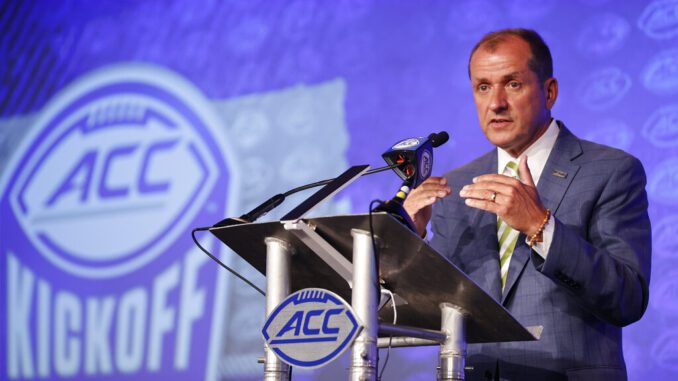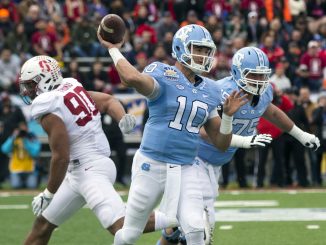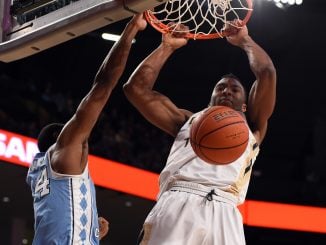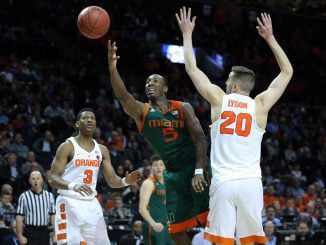
CHARLOTTE — ACC Commissioner Jim Phillips’ slip of the tongue was perhaps a sign of the times in college sports.
In discussing ways to improve the conference’s revenue stream to make it more competitive with the newly expanded SEC and Big Ten, Phillips said he would do what was best “for our 17 teams.” He then caught himself and correct it to 15 teams.
A few minutes later, he clarified again.
The ACC has 14 teams for football.
“I’ve been focused on expansion,” Phillips joked.
He’s not alone. A year after the SEC threw the first punch in the latest college realignment frenzy, taking Texas and Oklahoma from the Big 12, the Big Ten countered by raiding the Pac-12 for USC and UCLA.
Meanwhile, the ACC has stood pat, leading to concern that college football could become a two-conference show, with the league’s future unsure and unsettled.
During his half-hour opening statement, Phillips railed against the consolidation of college sports around football, extolling the importance of the nonrevenue generating Olympic sports.
“They forget that we field teams beyond football and men’s basketball,” Phillips said. “College athletics happens within the context of higher education. For decades, we’ve relied on the financial power of those two sports.”
Phillips was defiant that sports at the college level shouldn’t be a feeder system or minor league for pro teams.
“Those who clamor for a pay-for-play system disregard the collegiate principles of diverse offerings,” he said. “We are not the professional ranks. This is not NFL or NBA lite. This is not, or should not be, a winner-take-all structure. … College athletics has never been elitist or singularly commercial.”
As a member of the five power conferences that dominated football and men’s basketball over recent years, the ACC appears to be at risk of being on the outside looking in.
“I’ll continue to do what’s best for the ACC but will also advocate for a healthy neighborhood in college athletics,” Phillips said. “Not just for two or three gated communities.”
Phillips admitted that the position was a new one, given the ACC’s spot in the football hierarchy until recent moves.
“We’re probably in a gated community,” he said. “One of five. We’re going to try to find new ways to generate revenue for our conference, but it can’t be at the expense of all the other things we’re doing.”
That doesn’t mean the ACC isn’t looking at countermoves as the other major conferences reassemble.
“This is no time to be waving the white flag,” he said. “I’m not trying to be Pollyannish. I live in the real world. Times change. But for us to ignore the access and opportunity (Olympic sports) provide for young people would be a huge mistake. I’m not afraid of living in different communities. But community is best when all neighborhoods are healthy. Some schools will never reach $25-30 million in revenue. That doesn’t mean they don’t deserve to be part of the system, part of championships at times. They’re talking about different levels in Division I, different subdivisions. If we take that path for football and basketball, shame on all of us.”
While there are concerns that the ACC’s 14-year grant of rights deal would be sufficient to deter members from leaving for lucrative offers from other conferences, Phillips pointed out that Oklahoma, Texas, USC and UCLA all plan to wait until their current grants of rights expire before moving.
“The grant of rights, the nine-figure financial penalty, I think it holds,” Phillips said. “But your guess is as good as mine.”
There are also concerns that Notre Dame, a partial member, would choose to affiliate with another conference in football, but Phillips downplayed that.
“If there comes a time that Notre Dame would consider moving to a conference, I feel really good about it being the ACC,” he said.
Phillips began his remarks by calling on Congress to help college sports come up with a way to enforce NIL agreements.
“They have rocked the college athletics world,” Phillips said, while saying that he believes student-athletes have the right to profit off their image. “We vowed to stay within certain boundaries as relates to rules and regulations. This is one that doesn’t have any, right now.
“We all know inducements inaccurately described as NIL have upended recruiting,” he added. ”Only Congress can provide consistent standards and appropriate protection.”



